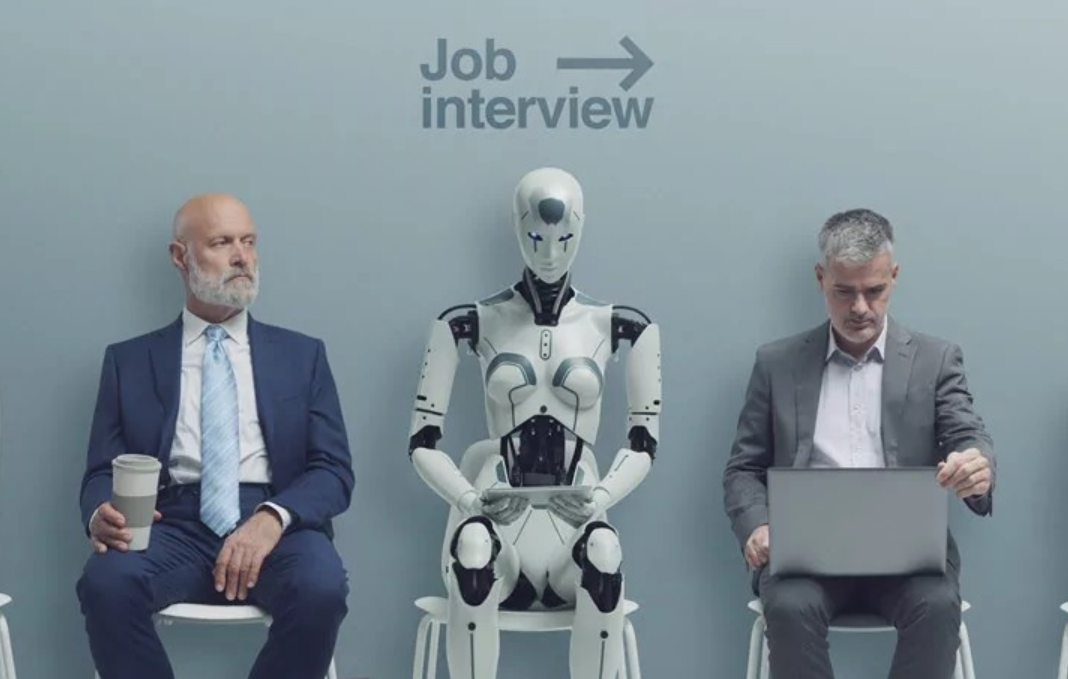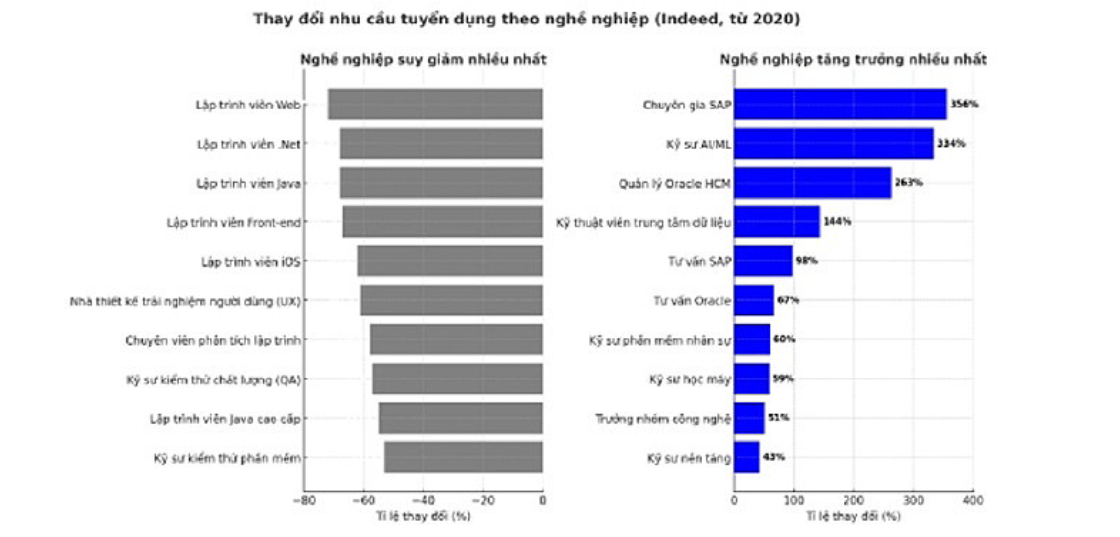Best Selling Products
Tech Job Market 2025: Opportunities and Challenges After the AI Fever
Nội dung
Looking ahead from 2020 to 2025, changes in the US tech industry reflect a clear trend: AI is not just a passing fad but a long-term force reshaping the entire job market.

For more than two decades, the technology industry has always been considered one of the most attractive "promised lands" for young people around the world. From the US, Europe to Asia, many young people choose to study information technology, software engineering, and computer science because of the open prospects: many jobs, attractive salaries, excellent benefits, and almost unlimited promotion opportunities. With just knowledge of programming, knowing a few popular languages, or having a little internship experience, many people have easily found a good job in companies from small to large. Even before the Covid-19 pandemic, technology companies had to compete fiercely to attract talent. Talented people can receive a series of job offers at the same time, enjoy desirable privileges such as flexible working, modern offices, and even luxury benefits.
But in just a few years, that whole picture has changed. After the pandemic, a series of large-scale layoffs have shaken the faith in the stability of the technology industry. And when artificial intelligence, especially ChatGPT, appeared in late 2022, everything was turned upside down again. The technology job market has gone from being a “paradise” with opportunities for everyone to becoming a fierce “battlefield” where only the truly good, with specialized skills and the ability to adapt quickly can survive.
1. The “purification” after the Covid-19 pandemic
The first phase of the job loss was the result of the Covid-19 pandemic. During 2020-2021, when the world was forced to shut down and all activities moved to the digital space, technology companies witnessed an unprecedented explosion in demand for their services. As a result, they hired massively and expanded their teams to meet that sudden increase. Tens of thousands of engineers, programmers, product designers, customer support staff, and data analysts were added to the workforce in just a few months.

But as the world slowly reopened, online demand dropped, growth slowed, and advertising revenue dried up, tech companies suddenly found themselves short of staff. In particular, fierce competition in the tech sector meant that many companies failed to deliver on their expected profits. The result was an unprecedented “purge” of staff. Meta, Amazon, Google, Microsoft, Twitter (later X), and a host of others announced layoffs totaling tens of thousands of people.
What makes this event so shocking is that many people previously believed that the technology industry was almost immune to economic crises. But reality has proven otherwise. The pandemic has shown that even industries considered “the backbone of the future” can face strong fluctuations. These large-scale layoffs not only directly affect hundreds of thousands of workers but also sow a sense of insecurity throughout the entire industry.
2. AI and the boost from ChatGPT
If the first phase was the result of “post-pandemic overpopulation,” the second phase stemmed from a revolutionary technological push: the launch of ChatGPT in late 2022.
ChatGPT wasn’t the first AI tool, but it marked a turning point when artificial intelligence first became so widely available and accessible. People could chat with it, ask it to write text, write code, translate, analyze data, and even create content in seconds. What surprised many was that the quality of what ChatGPT produced was good enough to replace some of the work that had previously been done by humans.

Brendon Bernard, senior economist at Indeed, pointed out that while there is no absolute evidence to conclude that AI is the direct cause of the continued decline in employment, it is difficult to deny the strong impact it brings. The trend of automation helps businesses save costs and increase productivity, which means the need to hire more staff is reduced. An employee can now do double or even triple the amount of work thanks to the support of AI. In that context, it is understandable that companies are no longer interested in expanding their teams.
From here, the requirements for candidates are getting higher and higher. The market no longer has room for those who only master basic skills. The remaining positions require deep expertise, the ability to work with AI and extensive experience. Companies increasingly prioritize candidates with 5 years or more of experience, who know how to manage projects, optimize systems or deploy AI-integrated technology solutions. Fresh graduates or those with only entry-level skills are almost "left out".
3. AI and data reign supreme, ordinary jobs fall away
Looking back from January 2020 to February 2025, the tech job market is sharply polarized. On one side, jobs related to AI, data, and enterprise technology are booming. On the other, the more common jobs that once made up the majority of the market are in serious decline.

First of all, the AI and machine learning related job group is becoming a “bright star”. Machine learning engineers, AI/ML experts not only remain in demand after the pandemic but also far exceed the recruitment level before 2020. This boom is not only coming from technology companies, but also from traditional industries such as finance, healthcare, retail, manufacturing, all of which want to leverage AI to optimize processes and enhance competitive advantages. The average salary of up to $260,000/year for a machine learning engineer is a clear testament to the value they bring.
In addition, enterprise technology also maintains a stable performance. Management solutions such as SAP, Oracle or Microsoft Dynamics are still the vital foundation for global enterprises. No matter how much technology changes, supply chain management systems, accounting, human resources, finance, etc. must still operate smoothly. This ensures a solid position for experts in the ERP field.
Next is data science, a field that has been hot for many years and is now becoming more important thanks to AI. In an era where data is considered the “new oil”, companies are willing to pay for experts who are good at analyzing, predicting and providing accurate insights. Today, a data scientist not only knows how to process big data but also needs to be proficient in AI tools to improve the quality of analysis. This combination makes them important factors in the development strategy of the business.
In contrast, the general job group is in a gloomy state. According to Indeed research, the number of software engineer job postings has decreased by 49% compared to the beginning of 2020. Mid-level programming positions such as Android, Java, iOS, .Net or web programming have decreased even more, by over 60%. Skills that were once considered a "golden ticket" are no longer enough to secure employment. Workers are forced to upgrade their skills and learn new areas if they do not want to be left behind.

4. Who among the young people in the industry will survive?
This reality is especially worrying for those new to the industry. Technology students, young programmers, and those transitioning into IT careers now face a much higher wall than previous generations.
In the past, candidates could find a job by just mastering a popular programming language and doing a few personal projects. Now they have to compete not only with their peers but also with AI, which can write basic code faster and more efficiently than humans. They also have to face experienced engineers who are willing to accept lower salaries to keep their positions. Fewer opportunities, higher requirements, and heavier pressure all make the journey to enter the technology industry for young people more difficult than ever.
However, from another perspective, many experts believe that this is a necessary “virtual filter”. The technology industry has gone through a “bubble” period when too many people rushed to learn programming just because they thought it was an easy path to a good job. The current decline in opportunities forces candidates to seriously invest in skills, creativity and systematic thinking. The technology industry will no longer be a land for the majority, but a playground for those who are truly passionate and have outstanding abilities.
5. The future of tech jobs
Looking ahead from 2020 to 2025, changes in the US tech industry reflect a clear trend: AI is not just a passing fad, but a long-term force reshaping the entire job market.
The question is not whether AI will replace humans, but who will know how to use AI to become more effective. Skills such as basic programming and building simple applications are gradually becoming things that AI can do better. Meanwhile, humans still have the advantage in creative thinking, designing overall systems, coming up with strategies and solving complex problems that AI cannot handle.

Therefore, instead of competing directly with AI, tech workers need to learn to see AI as a supporting tool. A good engineer knows not only how to write code, but also how to use AI to speed up work, reduce errors, and focus on more creative parts. A data scientist knows not only how to analyze manually, but also how to exploit AI models to find insights faster. A project manager knows not only how to coordinate personnel, but also how to integrate AI into the process to optimize performance.
Personally, I believe this is an inevitable turning point. Just as machines replaced manual labor, or the Internet eliminated many traditional jobs, AI will change the technology industry. But this does not mean that jobs will disappear completely. They will just take on new forms, require new skills, and the rewards will be for those who are willing to learn and adapt.
6. Conclusion
Looking back from 2020 to 2025, the tech job market has experienced two major shocks: the post-pandemic “cleanup” and the boost from the explosion of artificial intelligence. Both events have completely changed the way companies view human resources, as well as how workers need to prepare for the future. Those with in-depth skills in AI, data, and enterprise technology still maintain a solid position, even earning record-high salaries. Meanwhile, common jobs, which used to be an easy “gateway” into the industry, are gradually disappearing. The final message is clear: AI is not an enemy, but a companion. If you know how to take advantage of it, learn and upgrade yourself, you will not only survive but also be able to break through in the new era. But if you stand still, thinking that “just knowing how to code is enough”, you will most likely be the one left behind.












































